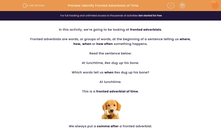In this activity, we’re going to be looking at fronted adverbials.
Fronted adverbials are words, or groups of words, at the beginning of a sentence telling us where, how, when or how often something happens.
Read the sentence below:
At lunchtime, Rex dug up his bone.
Which words tell us when Rex dug up his bone?
At lunchtime.
This is a fronted adverbial of time.
.jpg)
We always put a comma after a fronted adverbial.
Fronted Adverbials of Time
Fronted adverbials of time tell us when something happens.
Here are some examples:
Yesterday,
Last night,
A week ago,
At midnight,
On Wednesday,
Just then,
Can you make up a sentence using one of these fronted adverbials?
How about these?
Just then, the volcano grumbled and started to erupt.
Last night, a mysterious beast was seen walking down Penfold Lane.
On Wednesday, Suki’s nightmare became a reality.

Can you identify the fronted adverbial of time in the sentence below?
In the morning, a poor, abandoned kitten appeared on their doorstep.
Looking for the comma can be a clue because the fronted adverbial is all of the words in front of the comma. However, this sentence has two commas so we have to be careful.
In the morning, tells us when the abandoned kitten was found.
The second comma is to separate the two adjectives describing the kitten.

Look at the sentence below:
The captured elephant escaped from its enclosure.

Can you add a fronted adverbial of time to this sentence to make it sound more exciting?
We could have:
In the middle of the night, the captured elephant escaped from its enclosure.
At lunchtime, the captured elephant escaped from its enclosure.
In this activity, you’ll be on the hunt for fronted adverbials of time.








